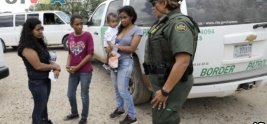(单词翻译:单击)
听力文本
They cannot go home again.
For many Hondurans forced to return to their place of birth, home means a return to the violence that sent them fleeing the country in the first place.
In the neighborhoods where they grew up, bodies are left unceremoniously in areas where workers are putting up buildings. Human remains are often carried away as if they were a load of food.
Heavily armed police watch from the back of pickup trucks. They stop to search passersby for weapons, drugs or signs they have ties to criminals.

At home, a crying woman tries to wash blood from the walkway where her relative was killed.
For those returning to Honduras, home is a neighborhood ruled by murderous gangs who want money and demand that young men become gang members. They kill those who refuse to obey.
These Hondurans cannot go back home. So many seek protection at a shelter for troubled youth in the capital, Tegucigalpa. At the shelter, the young men tell their stories.
Alexis, 18, arrived at the shelter two years ago after being sent home from Mexico. He says gang members threatened him many times because he would not join them. His mother told him he had to run.
Salm, 14, left home after gang members threatened to kill him for refusing to join. He was staying at a shelter in Nicaragua, but that country sent him back.
Jus, 15, fled Honduras after his father was murdered. He went to Guatemala, which sent him back.
I can't go back to where I was born, Jus says. In any case, I don't have any family there any longer.
The Associated Press is not publishing the full names of the young men or the shelter where they are staying for safety reasons.
Many deported families no longer have a home. They sold everything to pay for a trip north. Now they have nowhere to go, and in many cases, they still owe money for the trip.
A woman named Larissa, her husband and their two children left home after the Mara Salvatrucha gang tried to force her 14-year-old son to join.
Today it is a game. One day, those boys may have to make a decision: whether to join a gang, or to flee their homes.
I'm Susan Shand.
重点解析
1. no longer 不再
The order was no longer effective.
这项命令已不再生效。
2. as if 好像
You'll feel as if you were at home while here.
到这儿就好像到了自己家一样。
3. refuse to do sth 拒绝做某事
But what about those who refuse to comprehend the present?
但对那些拒绝理解目前的人来说又如何呢?
4. go home 回家,重返家园
He or she just wants to go home.
他们仅仅想要早点回家而已。
5. grow up 长大,成长
One of us has to grow up and get out of the circumstance (in order to help the other).
为了帮助另一个,我们其中之一必须成长起来,走出困境。
参考译文
他们再一次无家可归了。
对很多被迫要回到出生地的洪都拉斯民众来说,所谓的重返家园只是回到暴力之地,也正是因为暴力,他们才逃离了祖国。
在他们长大的地方,横尸遍野,而工人却在那里盖起了高楼大厦。遗骨总是像食物一样被运走。
全副武装的警力站在小货车车尾查看。他们会停下来搜查过往的路人,看他们身上是否有武器、毒品或者是否跟犯罪分子有关联。
一名恸哭的女子在家疯狂地清晰地走道上的血迹,他的一名亲属正是在这里死去的。
对于重返家园的洪都拉斯民众来说,家只不过是嗜杀成性的团伙控制的地盘罢了,这些团伙视财如命,还要求年轻男子为他们卖命。不服从的都要死。
这些洪都拉斯人不能回家了。所以很多人都在首都特古西加尔巴的避难所为深受困扰的孩子们寻求庇护。在避难所里,年轻人会讲述自己的故事。
亚历克西斯今年18岁,他2年前来到了这个避难所。在此之前,本在墨西哥的他被送回了家。他说团伙份子曾多次威胁他,因为他不愿意加入团伙。他的母亲告诉他只能逃命了。
扎尔姆今年14岁,他离开家是因为团伙份子威胁他说如果不加入就要他的命。他本来待在尼加拉瓜的一个避难所,但尼加拉瓜将他遣返回国了。
加斯今年15岁,他逃离了洪都拉斯,因为父亲被杀了。他来到了危地马拉,而危地马拉又将他遣返回国。
我无法回到出生地,加斯如是说道。我家里一个亲人都没有了。
美联社没有公布这些年轻人和避难所的全名,这是出于安全因素考虑。
很多受到驱逐的家庭已经没有家可言了。他们变卖家当,这样才有盘缠往北逃亡。现在,他们已无处可去,很多人都是因为没有钱才无处可去。
一位名叫拉瑞莎的女性与丈夫和2个孩子一起离开了家,因为萨尔瓦多帮试图迫使她14岁的儿子加入帮派。
今天或许只是个游戏,而有一天,这些男孩子就不得不作出决定:是加入帮派还是离开家园。
苏珊 尚德(Susan Shand)为您播报。
译文为可可英语翻译,未经授权请勿转载!


